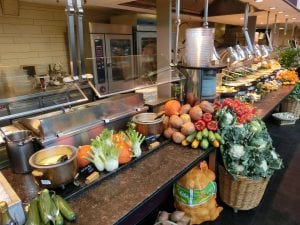The Dilemmas of Providing Catering in the Workplace
The arguments consistently used for operating catering services in many workplaces are productivity based, but Tricon’s Managing Director, Mike Coldicott suggests that in reality, there are many different drivers that must be considered for a successful operation.

The “increased employee productivity” argument is based on the theory employees will work more effectively, both individually and as teams, by enabling them to access all the catering facilities they need within their workplace. Social interactions within main dining facilities and breakout areas will bring teams together, provide spaces for group celebrations, enhance information flow and support networking thereby promoting a company culture. Additionally, quality catering services allow an organisation to develop business opportunities with clients and other partners.
Conversely companies are also encouraging breaks from desks and the taking of more daily exercise. This encourages employees to leave the building at lunchtime, to take some fresh air and exercise. How does this correlate with keeping people on site at lunchtime?
On-site catering facilities should allow the employer to influence the food that is served to employees and visitors and thus aim to encourage employee wellbeing through the menu offered in employee catering outlets, tea points or in meetings. This sounds like a worthy aim but the reality of commercial pressures and meeting employee expectations tempers this. As an example, many caterers will tell you that despite constantly being asked to stock more healthy items in vending machines, these same items end-up as the least popular sellers when they are stocked. Similarly, many staff restaurants still serve full cooked breakfasts and deep-fried fish and chips on Fridays because there’d be a big decline in income if they didn’t. Forcing only perceived healthy options onto a menu could then drive staff out of the building rather than keep them there.
Coffee bars present another set of challenges as demand for coffee continues to rise significantly across the UK. Should employers offer branded outlets which are popular and deliver good profit margins or should they follow the more recent trend of adopting one of the plethora of artisan brands that often have higher unit costs?
A further perceived productivity benefit is that food and beverage services act as an aid to recruitment and retention of staff. Most organisations currently operate in a competitive marketplace for staff and the provision of first class food and beverage facilities for employees that offer a variety of dining experiences and affordable prices, can be perceived as a significant employee benefit. Is this proven? Does an individual really choose one firm over a rival because there are a few more sandwich choices or a better choice of smoothie at lunchtime? Arguably it is the perceived benefit of the provision. The employer is saying “look at how grand our restaurant is, this shows just how important our people are to us”.
There are logical arguments behind all of these factors but, ultimately, is it really all about the money?